13+ Sample Commission Agent Agreements
-
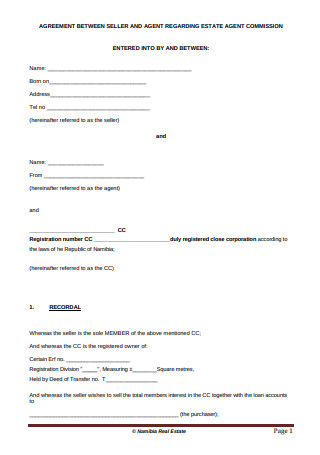
Seller and Commission Agent Agreement
download now -
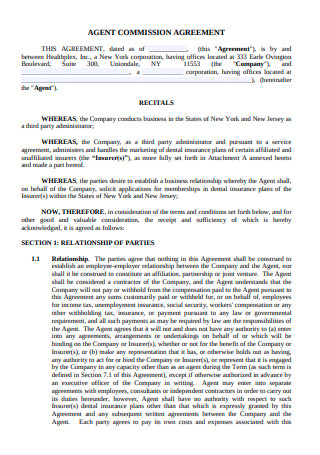
Sample Commission Agent Agreement
download now -

Brokerage Commission agent agreement
download now -
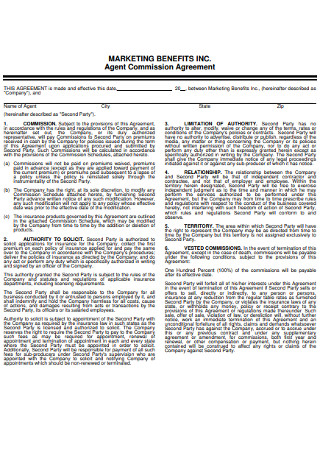
Simple Agent Commission Agreement
download now -
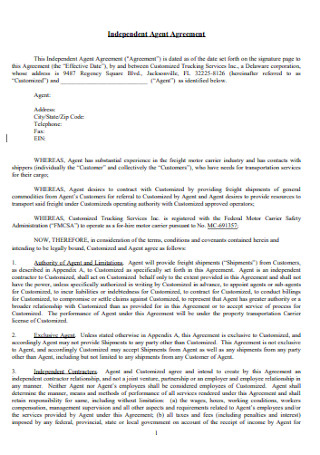
Independent Agent Commission Agreement
download now -

Buying Agent Commission Agreement
download now -
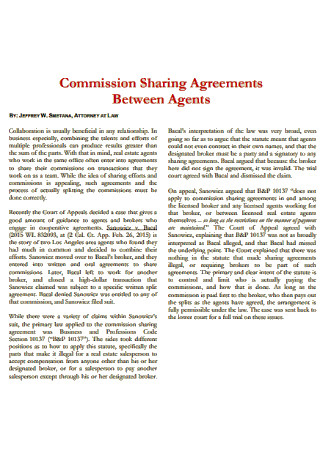
Agent Commission Sharing Agreement Template
download now -
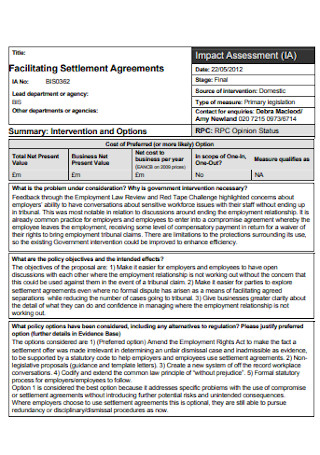
Agent Facilitating Settlement Agreement
download now -
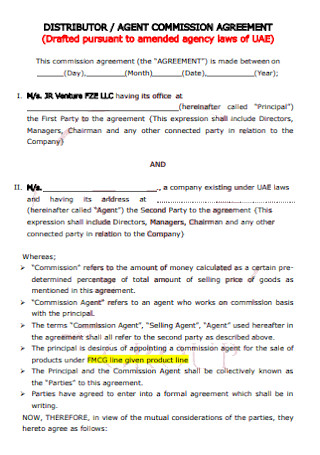
Distributor and Agent Commission Agreement
download now -
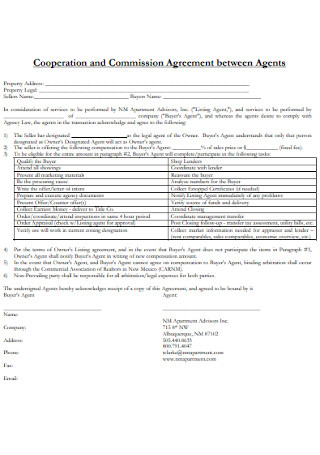
Cooperation and Commission Agreement Agent
download now -
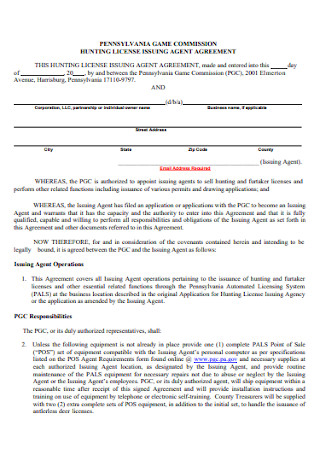
Agent Commission License Agreement
download now -
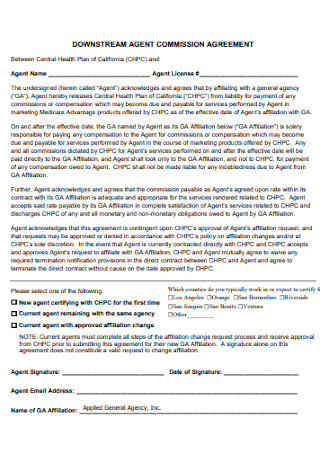
Downstream Agent Commission Agreement
download now -
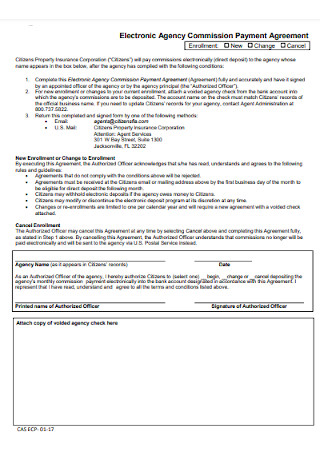
Agency Commission Payment Agreement
download now -
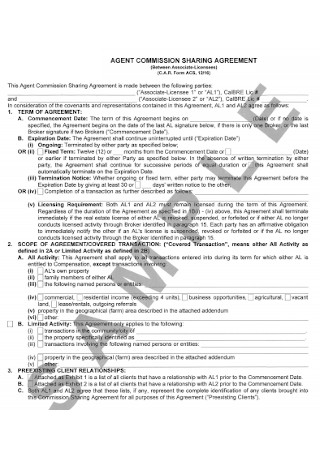
Agent Commission Sharing Agreement
download now
FREE Commission Agent Agreement s to Download
13+ Sample Commission Agent Agreements
What Is an Agent Commission Agreement?
Benefits of Working on Commission
Types of Sales Agents
How to Get More Agency Clients
FAQs
Do agents get all the commission?
What happens if you don’t get a commission?
Is a commission a royalty?
What Is an Agent Commission Agreement?
Commission-based employees must enter into an agent commission agreement. The contract specifies the job terms and ensures that the sales agent receives the agreed-upon portion of the salary. The employer and employee know what is expected of them through the agreement. The agreement contract outlines how much an agent is paid from a transaction, how payment is made, how frequently the employee is paid, and other employment-related conditions. Sales commission agreements are widespread in professions such as real estate agents, insurance brokers, sellers, landlords, and lessees. When a transaction is made, the entity that made the sale receives a portion of the sale proceeds. However, a contract is not required every time a sale is conducted. You will only need an agent commission agreement when you hire a new employee or when you are hired. As an employer, you must specify the labor agreement, including who receives the sales commission in whole or part. Make sure your employer allows you to sign a commission contract if you are employed as a sales representative and paid on commission. If you still need to, you can create a sales commission template for independent contractors. The range of sales commission rates is between 5% and 50%. However, the majority of enterprises pay between 20% and 30%. Start by evaluating how much it would cost to hire people under alternative sales commission systems, both for full-time employees and independent contractors, to discover the best fit that aligns with your sales objectives.
Benefits of Working on Commission
With the proper combination of work ethic, interpersonal skills, and self-discipline, commission-based work is a highly gratifying way to earn a livelihood and advance one’s career. These pay structures benefit sales professionals and their employers, as sales teams utilizing a sales compensation plan, make more as the company’s sales increase. There are numerous sales commissions, but motivated employees aiming to maximize their earnings potential can benefit from accepting a position that gives commission in addition to or instead of a basic income. Let’s examine six advantages of commission work.
Types of Sales Agents
A sales agent is a professional hired by a business to promote its products or services and represent its brand. Typically, sales agents are independent contractors who earn a commission based on the amount of merchandise they sell. Some sales representatives work for sales agencies that subcontract their employees. However, agency sales associates and unwanted persons can provide services according to the type of revenue-generating sales you may require. Typical types of sales representatives include:
1. Traditional sales agents
Traditional sales agents work for sales agencies, and businesses can hire them for a specific function. Traditional sales agents frequently have customer profiles or portfolios that the organization can utilize after hiring them. Typically, traditional agents get a commission on each sale.
2. Sales agency teams
Some sales agencies hire whole teams instead of just single agents. Companies can hire a sales agency team to make their sales work for them. Then, the company may have the sales agency team run the whole region or customer sector they were given. This option lets internal sales teams manage accounts, do market research, and figure out what the business will need in the future instead of selling products.
3. Businesses
Your company may develop a sales partnership with another organization. Sometimes, your company’s product may be compatible with the sales model of another company. For instance, you may collaborate with a printing company if you sell paper. The printing company may then sell your items alongside its own to boost the value and convenience of its products. This can help you reach extra clients in markets currently served by other firms.
4. Consultants
Business consultants can assist your sales by offering items, business alliances, or services that may enhance your income. This can be useful if your company mainly contracts with other companies. For instance, if your company manufactures computer hardware, a consultant may recommend your company to a computer company seeking a reliable supplier, so establish a business-to-business relationship.
5. Online sales agents
Online sales representatives are experts at utilizing technology, social media, search engines, and other digital tools to sell things online. If you sell your product predominantly online with minimum shipping and handling, you may choose to hire online sales agents. For instance, online sales agents can target appropriate markets and sell your product to enhance the paid application or mobile game sales.
How to Get More Agency Clients
Every marketing agency desires success. Signing many clients increases billings and revenue, but it isn’t easy. There are numerous digital advertising agencies to compete with, and with a recession looming, businesses are reducing their workforces rather than recruiting additional support and experience. However, with little ingenuity and aggressive strategies, your agency may develop its business even during difficult economic times. Here are some strategies for promoting your marketing business and attracting clients wishing to collaborate with you.
1. Know What’s Working
Before introducing something new, it is essential to evaluate existing techniques to determine what is working, what is not, and what needs improvement. Do you need to prioritize content creation? Do you need to dedicate more time to lead generation? These questions will assist you in identifying the tasks that require immediate attention. Then, you can either concentrate on improving the ineffective elements or eliminate them and shift your focus elsewhere.
2. Define business objectives and benchmarks
Your business has no direction without clear business goals. With business goals, you give your agency a sense of purpose and a clear path for where you want it to be in a certain amount of time. Writing down your agency’s goals gives your business direction and changes how you, your team, and others see your business. Start by ensuring that your agency’s business goals and milestones are SMART.
3. Shift Emphasis: Develop Unique Value Propositions
Defining your distinct value proposition is crucial to your agency’s sales and marketing efforts. Your value proposition demonstrates to prospects why they should choose your services over your competitors. By shifting the emphasis from pricing to your unique value proposition, you can help clients understand the worth of your solution and how it can benefit their businesses. With the right value proposition, you distinguish your firm from its competitors, assist clients in comprehending your giving, and attract the most qualified prospects.
4. Introduce a Framework for Sales Enablement
Sales enablement generates material personalized to your prospects’ requirements, thoughts, feelings, and pain areas using data from past transactions. Sales enablement focuses on material that assists the sales team in qualifying and nurturing prospects throughout the sales cycle. Consider it a combination of your sales and marketing efforts. With sales enablement, you may close business deals more quickly, streamline the sales process, and enhance your agency’s relationships with prospects and buyers.
5. Network Like The Pros and Partner Up
Professional networkers recognize that acquiring customers is a game and are driven to win. Moreover, they are in it for the long haul, so they play their cards correctly. Real networking is not about short-term gains. It is about establishing a long-lasting connection. First, you build a relationship and search for ways to assist it. Do not immediately attempt to sell; doing so will make you appear selfish. Also, collaborations are a terrific approach to acquiring new customers. As a marketing or advertising agency, you can form partnerships with non-competing businesses and organizations whose target audiences are comparable to yours. You can even collaborate with other organizations.
FAQs
Do agents get all the commission?
Most of the time, the agent gets 60% of the commission, and the broker gets 40%. However, the agent and broker could agree to split the commission 50/50, 60/40, 70/30, or any other way. Most of the time, more experienced and high-performing agents get a more significant share of the commission.
What happens if you don’t get a commission?
Unpaid salaries If you do not get your earnings, salary, earned commissions, bonuses, guaranteed benefits, or any remuneration that qualifies as wages, your employer owes you those wages plus interest, as well as the fees and costs associated with recovering them.
Is a commission a royalty?
The commission is paid based on an employee’s performance (for example, a successful business deal or sales performance). In contrast, royalties are payments provided to intellectual property owners in exchange for the use or licensing rights of that property over a predetermined period.
A respectable job will always involve contractual obligations. Therefore, you should be skeptical if you are engaged for a sales force but need to be furnished with an agent commission agreement. You can always draft your contract and ensure that the other party reads and comprehends the terms before signing.
